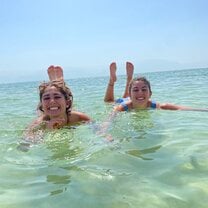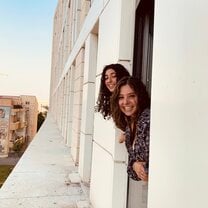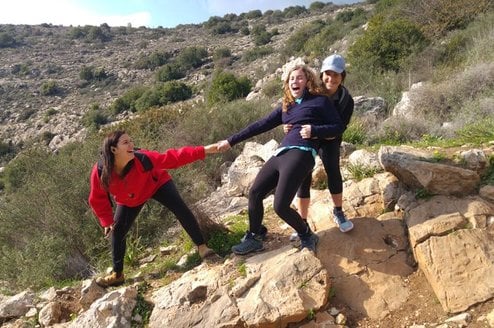As parents, when you send your 18-year-old thousands of miles away for a 9-month program—in a war zone—you are placing a great deal of trust in the leadership of that program. After several disappointing experiences, we lost that trust in Aardvark’s leadership and, together with our daughter, made the incredibly difficult decision to bring her home early.
While she had a positive and enriching first semester in Tel Aviv, the second semester in Jerusalem was a profoundly disappointing and distressing experience.
________________________________________
A Bit of Background
Our daughter is a shy and reserved young woman, but she has never had issues making or maintaining friendships. She’s a well-rounded teen with a close-knit group of friends from school and summer camp. Socially, she’s always managed to find her place—until the Jerusalem semester.
________________________________________
Participant Makeup
Aardvark participants often come with built-in support networks: friends from home, or family (grandparents, siblings, aunts, uncles) living in Israel. Many of the American participants are dual citizens or Israeli-Americans. Because of this, social circles and cliques are often pre-established. Those arriving solo, without family nearby, can be at a significant disadvantage from a social and support system perspective. Other students weren’t very willing to include my daughter, despite her efforts to reach out.
________________________________________
Program Structure
Aardvark gives participants a lot of independence. In Tel Aviv, students live in apartments scattered across the neighborhood, while in Jerusalem they are housed in the same apartment building. Students are expected to manage their own cooking, cleaning, internships, and coursework, all while following behavioral rules regarding alcohol, drugs, and conduct.
One major issue we observed is the lack of structure over Shabbat. Apart from the first weekend, there are no scheduled activities. This can be especially isolating for non-observant participants or those without established social groups. In Jerusalem, the city essentially shuts down. There is one madricha “on call” during Shabbat and many participants either travel to Tel Aviv or stay with family and friends—leaving others behind with little support. With no friends or activities to do in the city, my daughter found herself left alone every weekend sitting in her apartment.
________________________________________
Supervision and Leadership
There is approximately one madricha per 15 participants and there is one community manager dedicated to each city, reporting through the Program Director. There is also a Parent Liaison, a licensed social worker, who also reports to the director. The madrichim are very young—typically in their early twenties—and appear to lack the experience and authority to enforce rules or handle serious issues.
Warnings are issued when rules are broken, but repercussions are rare, and enforcement is inconsistent. The staff is stretched thin and ill-equipped to manage complex social dynamics or emotional distress. Many of the students break rules regarding alcohol/drug use or skipping internships/classes and have no consequences.
________________________________________
The Jerusalem Semester
Our daughter’s Jerusalem experience could best be described as “Real World: Jerusalem”—a small group (approximately 30 participants) full of drama. Sadly, she was socially bullied and ostracized by someone who had previously thought of as a close friend during the first semester in Tel Aviv. This individual intentionally excluded my daughter and spread rumors.
Despite her efforts to resolve the issue directly, her attempts were rebuffed. When she turned to staff for support, she was told to “try harder” and “give it time”—neither of which was helpful to a teen who was increasingly isolated and emotionally struggling.
As the situation worsened, we were in regular contact with the parent liaison. Eventually, I flew to Israel to support our daughter. During my visit, I witnessed the group dynamics and cliques firsthand. I met with the parent liaison, madricha, and community manager who confirmed that what our daughter was experiencing was social bullying.
I left Israel hoping for change, but unfortunately, the situation continued to deteriorate. Ultimately, we made the painful decision to bring her home early.
________________________________________
Leadership Response
We were deeply disappointed in how the program handled this situation. The participant who had bullied our daughter remained in the program without consequences. When we escalated our concerns to the Program Director, the response was dismissive, defensive, and lacking in empathy.
Even more troubling was our attempt to reach the Executive Director, Debbie Goldsmith. Her contact information is notably absent from the Aardvark website. After multiple requests through the parent liaison, we were told to fill out a form online to request a call—a step that felt deliberately bureaucratic and impersonal. In light of our experience, we expected the Executive Director to reach out to us proactively. When we finally spoke with her, her defensiveness and lack of responsibility only reinforced our concerns about the culture of leadership at Aardvark.
________________________________________
Final Thoughts and Recommendations
There are many gap year programs to choose from. Aardvark has an excellent outreach and marketing strategy—but before committing, make sure you trust the leadership behind the scenes. The tone and culture of the program come from the top, and in our case, that leadership fell far short when our daughter needed support the most.





